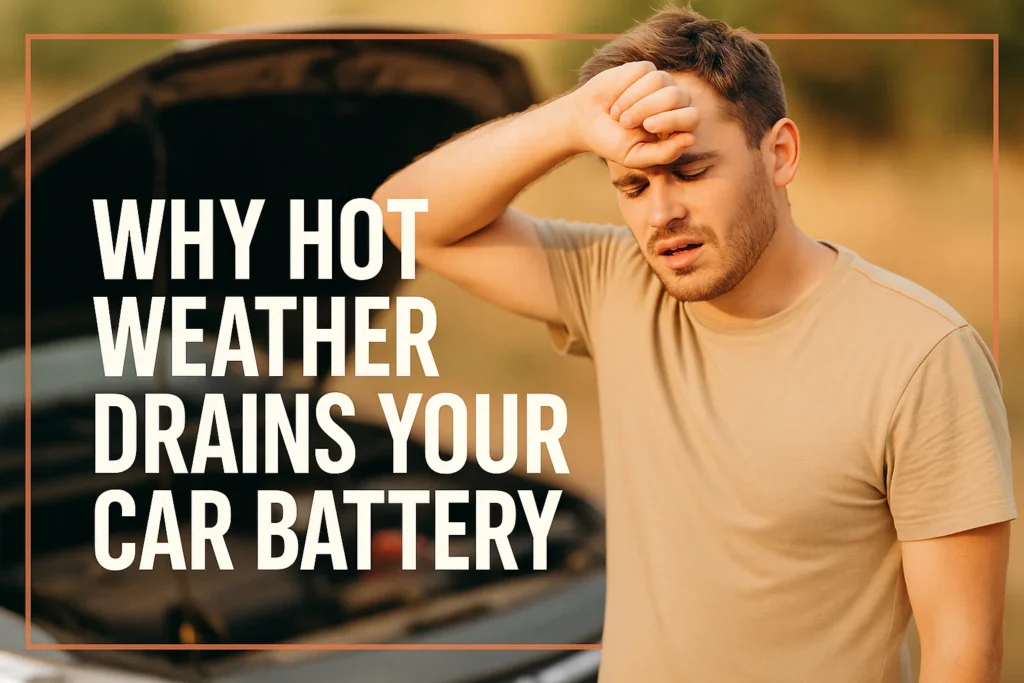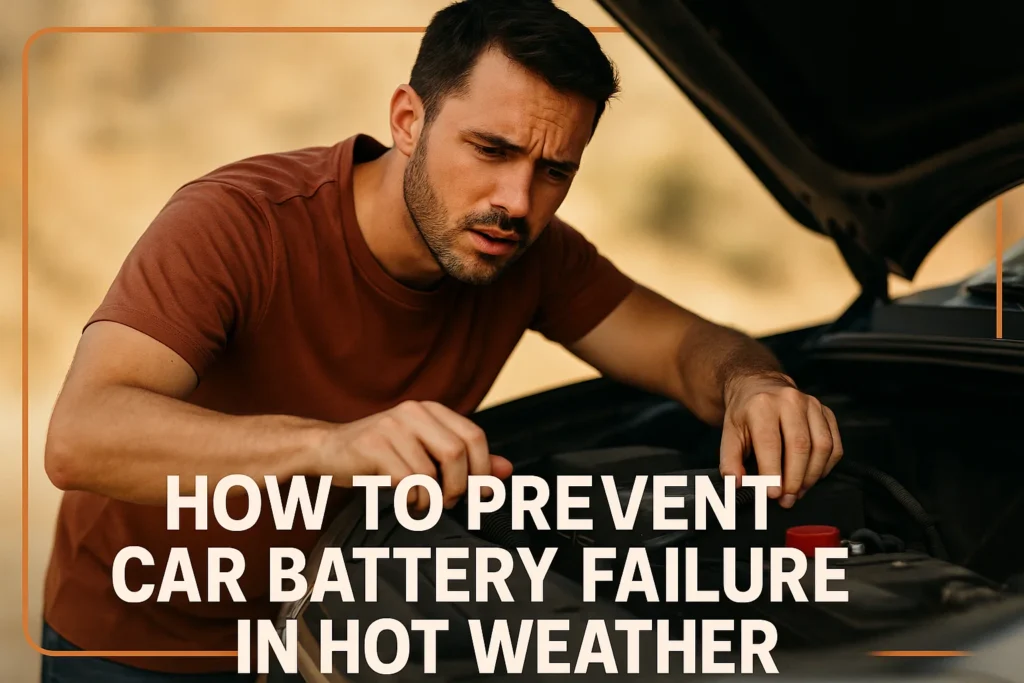It is summer time and along with it come sunshine driving, weekend trips and the endless road trips. However, as much as the sunshine is pleasant, too much heat may silently have a devastating effect on your car battery. Just imagine you are on a hot workday in Auburn, AL street, so you have a dead battery definitely not the best way to spend a summer day! Hot weather may cause chemical reactions that are in its battery to accelerate so quickly that your battery loses power or even dies at any given moment.
The good news? Following several of these useful tips and warning measures can help keep your battery healthy and prevent breakdowns, and allow you to take your worries with you throughout the summer. In this guide we will explore the effects of heat on your car battery as well as demonstrate how to keep it safely fully charged, prolong its service life and maintain its performance whatever the mercury rises.
Impact of Heat on Your Car Battery
Car batteries are not expected to perform optimally in all conditions especially when the heat level is extremely high, which may be very severe. The higher the heat, the higher the rate at which the internal chemical reactions occur in the battery resulting in rapid evaporation of the fluid, corrosion and internal damage. Hot weather is directly contrasted with cold weather as it speeds up the process of battery wear and splits that cause irreversible losses that shortening the battery life.
Key effects of heat on car batteries include:
- Electrolyte evaporation: Evaporating water in the electrolyte which is in the battery reduces the efficiency of the battery due to high temperatures.
- Internal corrosion: Heating increases the rate of corrosion of the battery plates and the battery cell loses its capacity to retain a charge.
- Swelling and leaks: The extremely high temperatures may cause the casing of the battery to swell and even release acid which is dangerous.
- Shorter life: A battery having spent considerable time in warm temperatures can die prematurely, expected to its 3-5-year life period.
Why Hot Weather Drains Your Car Battery

While you sleep in Auburn, AL, hot weather can degrade your vehicle battery. Here’s how:
Accelerated Chemical Reactions
Under high temperatures, chemical reactions in the battery accelerate, shortening the battery’s internal structure and decreasing how much it can hold a charge.
Increased Power Demand
With summer, comes the usage of air conditioners, fans, and other additional electronics which makes more load on your battery, particularly on some very short trips.
Fluid Loss
The fluid that is used as an electrolyte evaporates due to the heat to expose the lead plates and reduce the functioning of the battery.
Risk of Overcharging
Alternators work harder in the heat, and overcharging combined with high temperatures can damage battery plates and shorten lifespan.
Practical Tips to Protect Your Car Battery in the Heat
Hot weather imposes additional pressure on your car battery and yet, with few easy steps, drivers in Auburn can maintain their batteries in the best condition to prevent unexpected roadside breakdowns. Here’s how:
Check Battery Connections Regularly
Your battery won’t work well when connections are corroded and loose.
- Tighten terminals: Check to see that the battery posts are snug and tight. Loose connections can prevent the battery from charging properly.
- Clean corrosion: A oversight of cleaner, consisting of baking soda and water, will softly rinse off any white or greenish accumulation. Corrosion also lowers the performance of the battery and may lead to starting difficulties.
- Protect terminals: Rub a little petroleum jelly or terminal protectant on them to stop possible corrosion in the future and make the connection strong.
Park in Shaded or Covered Areas
When it is extremely hot it directly impacts the performance of your battery.
- Find shade: Parking in a garage, under carport, or under trees will help keep direct sun exposure to a minimum.
- Run sunshades: A windshield sunshade would be able to temper interior and engine heat, thus indirectly cutting battery strain.
Reduce Electrical Load
Your battery is likely to empty due to additional electrical load especially with high temperatures.
- Switch off unnecessary electronics: Avoid leaving internal lights, charging devices or infotainment systems on even when the engine is off.
- Reduce accessory usage on short journeys: Although you may have the AC, fans or speakers switched on, this will deplete the battery with little chance of the alternator recharging it first.
Maintain Proper Coolant Levels
Proper functioning of the cooling system avoids stress on the battery due to the overheated engine.
- Check coolant levels regularly: Low coolant levels may in turn lead to the overheating of the engine which indirectly heats the battery making it live shorter.
- Inspect cooling system components: Check the hoses, radiator and coolant reservoir, and keep them in good shape to keep optimal engine temperatures.
Regularly Inspect Battery Fluid Levels
Batteries that have incorporated removable caps require the checking of its fluid level.
- Measure electrolyte: Make sure that the liquid is on top of the plates of the battery. In case it is empty, fill with the help of distilled water.
- Avoid overfilling: excessive water may cause the acid to spill out and this can become hazardous and result in destruction of battery together with other parts that surround the engine.
Test Your Battery Periodically
Regular reviews enable you to identify possible issues before a breakdown.
- Use a digital voltmeter: A charged battery will read about 12.6 volts when the engine is not running.
- Signs of low readings: Less than 12.4 volts may be the first sign of a failing battery.
- Professional testing: Have your car tested by a mechanic to check its load testing or diagnostics test to check on the battery and charging system in your car.
How to Extend Car Battery Life in Extreme Heat
The long-term measures will help your battery last much longer and make sure that your car runs in all those hot summers of Auburn.
Routine Maintenance Checks
- Have the professionals inspect them at least twice a year.
- Check the battery case to see that it is not swelling or cracking or has any leakage.
Use a Battery Insulator
- Blankets may be used to insulate a battery against excessive heat inside the engine.
- They also assist in ensuring ideal working temperatures which decrease the evaporation of fluids.
Minimize Short Trips
- Frequent short trips prevent the battery from fully charging.
- Combine some of the errands so the battery can have time to recharge with the help of the alternator.
Upgrade to Heat-Resistant Batteries
- Others are specially built in hot climates.
- Seek to view labels as High-Temperature Resistant, or Extreme Heat Batteries.
Avoid Engine Overheating
- Stay on top of the cooling system- radiator, hoses and coolant levels.
- Engines that are overheated have the ability to heat the battery and speed up its deterioration.
Choosing the Best Car Battery for Hot Climates
Choosing the correct battery is of importance, especially in the case of places with severe heat, such as Auburn, AL.
Types of Batteries Suitable for Heat
Absorbent Glass Mat (AGM) batteries: Heat and Vibration resistant batteries.
- Deep cycle batteries: Handle frequent discharge and recharge better.
- Good quality lead-acid batteries: Opt for premium brands designed for hot climates.
Key Features to Look For
- Large reserve capacity: Guarantees high power for short-term demands of the battery.
- Terminals that are corrosion-free: increase connection life.
- Heat-resistant Case: It does not warp or leak due to intense heat.
Professional Advice
- Go to reputable Auburn auto shops to obtain recommendations in relation to your type of car and local climatic conditions.
- Make sure that it can be used within your electric system in the car.
Professional Car Battery Maintenance in Auburn, AL
In some cases, the most appropriate measure of battery failure prevention is to resort to professional knowledge. The services of the local Auburn mechanics are the following:
Testing and diagnostics on battery: Locates weak / failing batteries in advance of breakdown.
Battery replacement: Replacing older batteries with good disposal of the old and new batteries, which are heat-resistant.
Charging system check: Checks that the alternator is working effectively and that the voltage regulator is working well.
Preventive maintenance programs: Inspecting to avoid summer surprises.
Professional maintenance not only prevents battery failure but also saves money by avoiding roadside emergencies and costly repairs.
Conclusion
The hot climate presents battery challenges quite different from those encountered in cold climates, challenges to car batteries as they evaporate fluid and internal corrosion. However, failure can be avoided and the life of the batteries can be extended through having knowledge of possible risks, frequently servicing batteries, and selecting a suitable battery. To keep on the road, Auburn drivers should to emphasize parking under shade, inspection, and professional assistance. Summer heat should not leave you stranded, take proactive action today and keep your car battery in tip-top shape and functioning.
For reliable battery checks and roadside assistance in Auburn, AL, trust Burnham Towing to keep you on the road. Don’t wait for a breakdown let us help you stay prepared and safe all summer long!
FAQs
Standard battery of car battery lasts 3- 5 years. However, the high temperatures will enhance chemical reactions and evaporation of fluids, which makes the battery tire more easily and break down at an earlier date than usual.
Not all car batteries are not constructed to resist high temperatures. Batteries such as AGM (Absorbent Glass Mat ) or those that are marked as heat-resistant have been specifically made to facilitate hot conditions and would do better when faced with extreme situations.
During hot weather, it would be advisable to inspect your battery once every month. Moreover, before long journeys, it should be checked to make sure that it is charged and able to cope with greater use of electrical appliances.
Yes, short trips so close together do not allow your alternator to recharge this battery in the fullest sense. This added pressure on top of high temperatures may cause the battery to become weak and subject it to an even higher chance of failing.
Absolutely. Inspections, testing, and routine preventive maintenance of the battery by a professional can help detect the problem in advance. This will be helpful to decrease the odds of unexpected breakdowns and prolong the general life of your battery.





